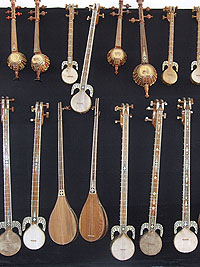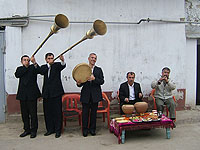 |
|
Uzbekistan - Music |
||||
|
The development of a genre of musical drama promoted origin of a theater of opera and ballet in Uzbekistan. With the first operas there were opera troupes (M. Koryokubov, Kh. Nosirov, B. Mirzaev, K. Zokirov; later N. Khoshimov, S. Khojaeva, S. Kobulov, S. Yarashev, A. Azimov, composer F. Shamsutdinov, T. Sodikov, M. Ashrafy, M. Burkhonov, and S. Yudakov). Chamber-instrumental music has originated. Songs and romances, musical drama and opera, symphonic and chamber music developed rapidly in early 40s. Development of choir songs promoted mass spreading of choir groups (M. Burkhonov, I. Akbarov, S. Boboev, B. Umidjonov). Cantatas and oratories were written, with the content of romance becoming a more precise. Music for the motion pictures emerged as an independent genre. Primary and special schools, colleges and higher educational institutions specialized in music extended, The symphonic music saw its rise (I, Akbarov, G. Mushel, R. Khamroev, F. Yanov-Yanovsky, S. Jalil, M. Tojiev, M, Makhmudov). In 1962 the second opera theater was opened in Samarkand. The large part of operas of those years was written on historical and modern themes (S. Boboev "Khamza", I. Khamroev "Oijamol", children's operas - S. Boboev "Yoriltosh" and S. Varelas "The magic lamp of Aladdin"). Ballets on various topics have also emerged (T. Mushel " Kashmir afsonasi" - "The legend of Kashmir", M. Ashrafy "Sevgi tumori" - "Amulet of love"). The most significant one was the ballet "Tanovar" by F. Kozlovsky (1971). Cinema and theatrical music achieved significant development in 60-70s. Concerts of the Uzbek maqom, orchestra of Uzbek national instruments, choir chapels, and symphonic orchestras enriched the program of music broadcasts by the Uzbek Radio and TV station. In the last decades of the 20th century the musical culture of Uzbekistan continued on its original national traditions with various contemporary social and art phenomena, as well as tendencies. It was represented not only by rich musical folklore and traditional classical music, but also modem music in all variety of its forms, genres, styles, and peculiarities. Since Uzbekistan gained its independence, a significant attention is being paid towards spirituality, enlightenment, and revival of true national traditions. From 1996 and on, the competition for the best song, namely " Uzbekistan - my country", is annually carried out in the country. The folklore ensembles such as "Beshkarsak" of Samarkand, "Boysun" and "Shaiola" of Surkhandarya, "Mokhi Sitora" of Bukhara, "Chavky" of Andijan, "Yor-yor" of Namangan , and others are worth mentioning. Also, national musical cultures of other nations residing in Uzbekistan are regarded with enormous care and consideration in the country. Celebration of Days of culture and arts of the CIS and other countries in Uzbekistan serves as a vivid example for the aforesaid. International music festival such as "Shark taronalari" ('Melodies of Orient 1 ) is considered as a significant music event in the region, held once in two years since 1997 in Samarkand. Musicians and singers from around the world usually take part in this festival of music. There are several other music competitions annually held in the country. Currently there are more than 300 musical schools and schools of arts in Uzbekistan with a total number of attending students exceeding 74,000. Besides, six secondary specialized boarding schools and lyceums with attendance of more than 3,000 children, and other 20 secondary specialized educational institutions with more than 7,300 children as students, now operate in the country. |


